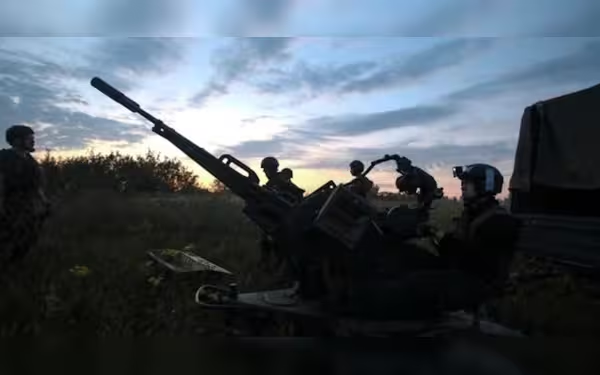Saturday, November 16, 2024 07:24 PM
Zelensky's Visit: Navigating Military Support in Ukraine Conflict
- Zelensky seeks increased military support from Western allies.
- US cautious about Ukraine striking Russian targets.
- Putin warns of potential escalation to World War III.
 Image Credits: asiatimes
Image Credits: asiatimesZelensky's US visit raises critical questions on military support and potential escalation in the Ukraine conflict.
In recent weeks, the ongoing conflict in Ukraine has taken center stage in international discussions, particularly with the arrival of Ukrainian President Volodymyr Zelensky in the United States. His visit, which began on September 22, included crucial meetings with key figures such as US President Joe Biden and Vice President Kamala Harris. Zelensky is set to unveil his "plan for victory" in the Ukraine war, a strategy that has raised significant questions about the extent of military support from Western allies.
A central issue in these discussions is whether the United States will allow Ukraine to use Western-supplied missiles to strike targets within Russia. Currently, the US government has placed restrictions on Ukraine's use of the Army Tactical Missile System (ATACMS), which can reach up to 190 miles, preventing it from being aimed at military targets inside Russia. Additionally, the US has the authority to restrict the use of Storm Shadow cruise missiles, developed by a UK-French consortium, due to their American-made components.
UK Prime Minister Keir Starmer has reportedly urged President Biden to reconsider these restrictions, but Biden remains cautious. On September 22, he stated that he had not yet made a decision, expressing concerns about provoking Russian President Vladimir Putin into a direct confrontation with the US or its European allies. This caution is not unfounded; on September 12, Putin warned that if Western nations allowed Ukraine to use missiles against Russian targets, it would signify that NATO countries are "at war with Russia," potentially altering the conflict's dynamics and hinting at the use of nuclear weapons.
Some commentators have echoed Putin's sentiments, suggesting that NATO's actions could lead to a broader conflict, even labeling it as a potential "World War III." Stephen Bryen, a former senior US Defense Department official, argued in an op-ed that the US government is eager to escalate the situation, as they recognize the failures of their current Ukraine policy.
However, a more nuanced perspective is essential. Authoritarian leaders like Putin often exploit the free press in democratic nations to project power and instill fear. They aim to weaken the resolve of those supporting Ukraine, banking on the idea that democratic partners will eventually grow weary of the financial burden of the conflict. Meanwhile, Putin faces less domestic pressure due to strict measures against dissent regarding Russian military actions.
As the situation unfolds, it is crucial for the international community to remain steadfast in its support for Ukraine while carefully navigating the complexities of military aid. The stakes are high, and the decisions made in the coming days will significantly impact not only Ukraine's future but also the broader geopolitical landscape. It is imperative that leaders do not allow Putin to dictate the terms of this conflict, as doing so could have far-reaching consequences for global stability.













